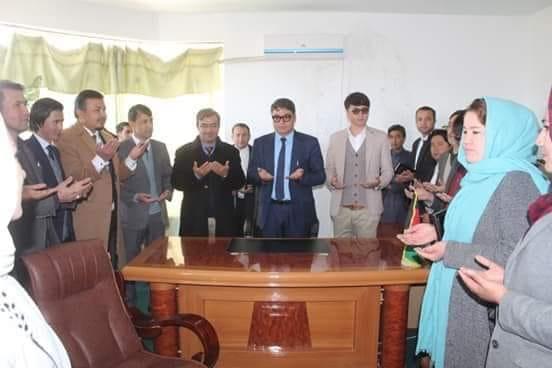NEILLI (Pajhwok): Over 26 percent government employees in central Daikundi province are women including eleven female directors and deputy directors, with eight government departments having no woman employee, Pajhwok Afghan News has reliably learnt.
Over 3730 men and 1340 women work in government offices in Daikundi, according to Pajhwok’s findings.
While the departments of Economy, Public Works, Energy and Water, Information and Cultural, Barisha Shirkat, Environment Protection, Land Authority and Central Statistics have no female employee.
Five women are head of departments and six are directors of different directorates in the province.
Pajhwok Afghan News interviewed a number of educated women in the province, who claimed that administrative corruption blocked their employment in government offices.
But officials of government departments reject corruption and stress the need for recruiting more women employees. They say women’s low level of qualification is one of the reasons behind their under-recruitment in government institutions.
Daikundi is yet to achieve the benchmark of hiring 30 women staff
Over 73 percent of employees in Daikundi government institutions are men while over 26 percent are women. This difference has concerned rights activists.
Shema Rustamyan, head of Daikundi Provincial Council and a women rights activist, said: “Despite security improvement in Daikundi, a large number of educated women are jobless.”
She said at least 40 percent of government employees should be women in Kaikundi because a high number of women were educated and security situation was better.
“Women are deprived of employment for different reasons and maybe administrative corruption or nepotism is involved in the process,” she said.
Mirza Hussaini, head of civil society organisations, was concerned about low presence of women in government offices in the province and said their percentage should be increased to at least 40 percent from the current 26 percent.
“Security situation is good in Daikundi and women here have suitable environment to work in government office, but unfortunately they have a little presence,” he said.
He said women’s low level of capacity and administrative corruption in several departments were preventing women from progressing and getting hired.
Laila Saberi, a journalism faculty teacher and women’s rights activist, said the presence of women in government institutions was not as good in Daikuandi as in other provinces and the 30 percent women work force benchmark was yet to be achieved.
“Every day the capacity and education level of women in Daikundi is increasing but still a small number of them are hired,” she said.
8 government departments sans female employees
Pajhwok Afghan News has learned that no female employee works in the Economy, Public Works, Energy and Water, Information and Cultural Affairs, Barishan Shirka, Environment Protection, Land Authority and Central Statistics Organisation.
The Provincial Council head says some institutions in Daikundi have no woman employee.
He added the only reason why women were not hired in these institutions was corruption and references.
Saberi also termed absence of women employees in eight Daikundi government institutions as worrisome and said these institutions should be grilled over not hiring women employees.
Educated women but unemployed
Aqela Noorzai, a graduate of engineering faculty from Kabul University, said: “For the past two years, I have been jobless. I applied for job in government institutions but received no response.”
She complained corruption plagued government institutions and individuals who had money and connections were offered jobs.
Fahima Roesh, another unemployed educated women, complained that after graduating from sociology, she had been looking for a job, but in a vain.
She said: “You won’t believe I had applied at 30 public and private institutions for work but was unable to find one. I have no reference or money to get shortlisted. If shortlisted, I can pass the exam.”
Suggestions and solutions
Laila Sabiri, an instructor at the Journalism faculty, said: “Women education increases each day, but still a less number of women get jobs in departments, we want to see women on high ranks.”
She said the government should implement law and give women jobs in its offices and take steps for increasing of women’s capacities.
She said it was local government’s responsibility to recruit women and bring pressure on departments lacking female personnel.
Mirza Hussiani, civil society association head, also expressed his deep concern over the lack of females in Daikundi departments and said at least 40 percent of employees should be women.
He said first the government should increase women’s education level and then task government institutions to recruit women workers at their offices. He also blamed corruption for less number of female workers.
Officials’ response
Marzia Hamdard, Daikundi gender department head, said the limited number of women in government organizations was due to lack of skill and government’s in-attention in this regard.
But she said efforts were underway to increase the number of females in government departments at earliest possible.
Masoma Hussaini, acting women affairs director, told Pajhwok they had launched efforts to increase women’s presence in the government sector through conducting awareness programs in the province.
Hamayoon Binesh, reform and civil services administration director, said they had announced all vacant posts for competition and men and women were sending applications.
“We recruit those who take high marks among candidates. We consider five marks as privilege for women but still they often fail the exam.”
He said efforts were underway to increase the number of employed women to 30 percent in government offices by 2020.
Response of government institutions that lack female employees
Awiz Ali Poya, economic department director, told Pajhwok they would fill vacant posts with female workers and in the past they did not recruit women due their weak capacity.
Khodadad Seerat, Public Works Department head, held similar views and promised to hire some women in future.
Information and Culture department director Hussain Seerat said they always announced vacant posts for competition and hired those getting highest marks.
He also promised to increase women’s education level in cooperation with other departments.
nh/pk/ma
Visits: 5









GET IN TOUCH
NEWSLETTER
SUGGEST A STORY
PAJHWOK MOBILE APP